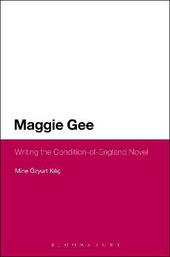
|
Maggie Gee: Writing the Condition-of-England Novel
Paperback / softback
Main Details
Description
The first female Chair of the Royal Society of Literature and translated into thirteen languages, Maggie Gee is writing the Victorian condition-of-England novel for 21st-century Britain. In the first critical study of Gee's work, Mine OEzyurt Kilic identifies the specific social problems her novels address and explains the social consciousness similarities Gee shares with the Victorians. Analyzing how Gee adjusts the condition-of-England novel to reflect contemporary Britain enables OEzyurt Kilic to reveal the accuracy of Gee's rich portraits of Britain. She focuses on Gee's ability to cut across the boundaries of race, class and gender, mix voices from the margin with the majority and challenge and change the idea of the mainstream. As an active, self-conscious and critical participant in the literary world, Gee paints a panoramic view of society. Her critiques of class, race and the world of publishing, allow OEzyurt Kilic to cover a wide range of topics and detail how English fiction shapes and influences, and is shaped and influenced by, the contemporary literary market.
Author Biography
Mine OEzyurt Kilic is Associate Professor in the Department of English Language and Literature at Dogus University, Istanbul, Turkey.
ReviewsOne can end here with hope, as Gee's novels so often do, that Kilic's attention to her work raises her profile, promotes wider reading of her fiction, and aids the enacting of its wish that it might change readers' opinions and actions enough to have palpable effects on the betterment of humankind, in Britain and beyond. It certainly has the power to do so. -- Sarah Dillon, University of Cambridge * Contemporary Women's Writing * Mine OEzyurt Kilic perceptively demonstrates that Gee blends the tradition of the Victorian social problem novel with experimental literary techniques to examine pressing social and environmental issues in late twentieth century and contemporary Britain. The first full-length study of her fiction, this excellent analysis of Gee's themes, concerns, style, and craft, gives an important British writer the long-overdue critical attention she deserves. -- Dr Emma Parker, Senior Lecturer in English, University of Leicester, UK Combining close reading of texts with thematic discussion, Mine OEzyurt Kilic creates a comprehensive and intellectually stimulating account of Maggie Gee's fiction. Her analysis of Gee's work in the context of the condition-of-England novel and related cultural/social topics is perceptively argued. The study, and the interview with Gee it introduces, will prove invaluable to students and researchers. -- Dr Paulina Palmer, author of The Queer Uncanny: New Perspectives on the Gothic (University of Wales Press, 2012) Mine Ozyurt Kilic's Maggie Gee makes an entirely convincing argument for Gee's importance as one of our most interesting contemporary writers. Kilic contends that Gee's fiction inherits yet rewrites the tradition of the Condition of England novel, and debates the relationship between modernist self-referentiality and ethical engagement to create what she terms a 'self-conscious' realism. The book also carefully elaborates her interest in questions of authorship within the contemporary culture industry, the importance of family and the connections between ecological issues and ethnic and racial rivalries. What runs through all her works, Kilic argues, is an ethics of connection that ultimately transforms the relationship between individuals and their larger collectives. This is a wonderfully rich and well-informed exploration of Maggie Gee's work. -- Susan Watkins, Reader in Twentieth-Century Women's Fiction, Leeds Metropolitan University, UK OEzyurt Kilic's book should be warmly welcomed. Indeed, the questions it poses about the connections between social engagement and narrative innovation are helpfully provocative and it focuses us on the importance of Gee's voice in the contemporary literary landscape. * European Journal of English Studies *
|